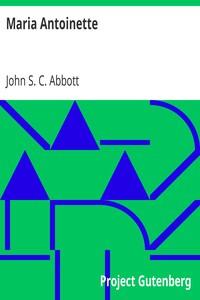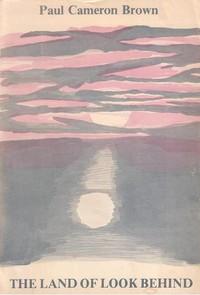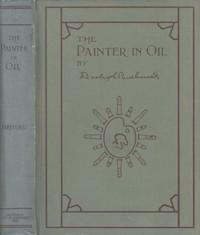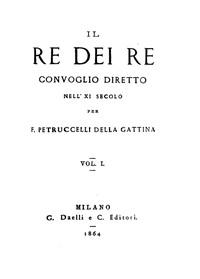Read this ebook for free! No credit card needed, absolutely nothing to pay.
Words: 13824 in 3 pages
This is an ebook sharing website. You can read the uploaded ebooks for free here. No credit cards needed, nothing to pay. If you want to own a digital copy of the ebook, or want to read offline with your favorite ebook-reader, then you can choose to buy and download the ebook.
Eternal Life
Philadelphia Henry Altemus
Copyright 1896 by Henry Altemus.
ETERNAL LIFE.
ONE of the most startling achievements of recent science is a definition of Eternal Life. To the religious mind this is a contribution of immense moment. For eighteen hundred years only one definition of Life Eternal was before the world. Now there are two.
It may be unnecessary to notice at the outset that the definition of Eternal Life drawn up by Science was framed without reference to religion. It must indeed have been the last thought with the thinker to whom we chiefly owe it, that in unfolding the conception of a Life in its very nature necessarily eternal, he was contributing to Theology.
Mr. Herbert Spencer--for it is to him we owe it--would be the first to admit the impartiality of his definition; and from the connection in which it occurs in his writings, it is obvious that religion was not even present to his mind. He is analyzing with minute care the relations between Environment and Life. He unfolds the principle according to which Life is high or low, long or short. He shows why organisms live and why they die. And finally he defines a condition of things in which an organism would never die--in which it would enjoy a perpetual and perfect Life. This to him is, of course, but a speculation. Life Eternal is a biological conceit. The conditions necessary to an Eternal Life do not exist in the natural world. So that the definition is altogether impartial and independent. A Perfect Life, to Science, is simply a thing which is theoretically possible--like a Perfect Vacuum.
Now it will speedily appear that a distinct relation exists, and must exist, between complexity and longevity. Death being brought about by the failure of an organism to adjust itself to some change in the Environment, it follows that those organisms which are able to adjust themselves most readily and successfully will live the longest. They will continue time after time to effect the appropriate adjustment, and their power of doing so will be exactly proportionate to their complexity--that is, to the amount of Environment they can control with their correspondences. There are, for example, in the Environment of every animal certain things which are directly or indirectly dangerous to Life. If its equipment of correspondences is not complete enough to enable it to avoid these dangers in all possible circumstances, it must sooner or later succumb. The organism then with the most perfect set of correspondences, that is, the highest and most complex organism, has an obvious advantage over less complex forms. It can adjust itself more perfectly and frequently. But this is just the biological way of saying that it can live the longest. And hence the relation between complexity and longevity may be expressed thus--the most complex organisms are the longest lived.
"Principles of Biology," p. 82.
We are now all but in sight of our scientific definition of Eternal Life. The desideratum is an organism with a correspondence of a very exceptional kind. It must lie beyond the reach of those "mechanical actions" and those "variations of available food," which are "liable to stop the processes going on in the organism." Before we reach an Eternal Life we must pass beyond that point at which all ordinary correspondences inevitably cease. We must find an organism so high and complex, that at some point in its development it shall have added a correspondence which organic death is powerless to arrest. We must, in short, pass beyond that finite region where the correspondences depend on evanescent and material media, and enter a further region where the Environment corresponded with is itself Eternal. Such an Environment exists. The Environment of the Spiritual world is outside the influence of these "mechanical actions," which sooner or later interrupt the processes going on in all finite organisms. If then we can find an organism which has established a correspondence with the spiritual world, that correspondence will possess the elements of eternity-- provided only one other condition be fulfilled.
That condition is that the Environment be perfect. If it is not perfect, if it is not the highest, if it is endowed with the finite quality of change, there can be no guarantee that the Life of its correspondents will be eternal. Some change might occur in it which the correspondents had no adaptive changes to meet, and Life would cease. But grant a spiritual organism in perfect correspondence with a perfect spiritual Environment, and the conditions necessary to Eternal Life are satisfied.
The exact terms of Mr. Herbert Spencer's definition of Eternal Life may now be given. And it will be seen that they include essentially the conditions here laid down. "Perfect correspondence would be perfect life. Were there no changes in the environment but such as the organism had adapted changes to meet, and were it never to fail in the efficiency with which it met them, there would be eternal existence and eternal knowledge." Reserving the question as to the possible fulfilment of these conditions, let us turn for a moment to the definition of Eternal Life laid down by Christ. Let us place it alongside the definition of Science, and mark the points of contact. Uninterrupted correspondence with a perfect Environment is Eternal Life according to Science. "This is Life Eternal," said Christ, "that they may know Thee, the only true God, and Jesus Christ whom Thou has sent." Life Eternal is to know God. To know God is to "correspond" with God. To correspond with God is to correspond with a Perfect Environment. And the organism which attains to this, in the nature of things must live for ever. Here is "eternal existence and eternal knowledge."
Free books android app tbrJar TBR JAR Read Free books online gutenberg
More posts by @FreeBooks

: Maria Antoinette Makers of History by Abbott John S C John Stevens Cabot - Marie Antoinette Queen consort of Louis XVI King of France 1755-1793









